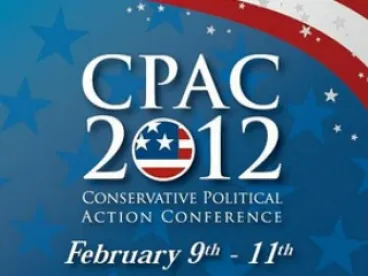Conservative lawyers dismiss threat of foreign money, anonymous political spending at CPAC
Anonymous political speech. Foreign money in U.S. elections. The proliferation of super PACs. How grave a threat do any of things pose to American democracy? Not much, according to a panel of conservative attorneys, who gathered Thursday at the Conservative Political Action Conference in Washington, D.C.
The high-profile legal minds on the CPAC panel largely agreed that the changes to the campaign finance landscape are grounds for celebration.
Thanks to the Citizens United decision, we’ve seen “more voices, more competition, and more accountability,” said panelist Benjamin Barr, a senior fellow at the Goldwater Institute, a conservative think tank.
“Without SpeechNow.org, the Republican nomination would have been sewed up weeks ago,” added Brad Smith, the former chairman of the Federal Election Commission who co-founded the Center for Competitive Politics, a nonprofit that promotes First Amendment political rights. “And in 2010, we would have had fewer competitive races.”
In the Citizens United v. Federal Election Commission case in 2010, the U.S. Supreme Court allowed corporations and unions to spend unlimited amounts of money from their treasuries on ads and other activities to influence the election or defeat of federal candidates so long as they are not coordinating with the candidates’ campaigns.
A few months later, in SpeechNow.org v. Federal Election Commission, used the Supreme Court’s reasoning and decided that limits on individual contributions to groups that make independent expenditures are unconstitutional.
These rulings gave rise to the creation of what are called super PACs — political organizations that can receive unlimited corporate, union and individual contributions and make unlimited expenditures to advocate for the election or defeat federal candidates. During his 2010 State of the Union, President Barack Obama condemned the court’s Citizens United ruling and warned that foreign interests would be able to “spend without limits” — a criticism that earned a rebuff from Justice Samuel Alito, who mouthed “not true,” while listening to Obama’s address in the chamber.
Smith, during the panel, said that he is “not frightened” by the prospect of Brits, Colombians or even Syrians spending money in the U.S. political process.
“I’m not that alarmed if foreigners [want to be involved in U.S. elections],” Smith said. “It doesn’t worry me.”
He expressed more concerned about the prospect of forcing government contractors to abstain from making political contributions.
“One of the new things the left is trying to do is get anyone who is a government contractor silenced,” he said.
The panel, entitled, “What’s Up With Campaign Finance?,” was moderated by Dan Backer, the principal attorney for DB Capitol Strategies PLLC. Backer’s legal career has included spearheading the major campaign finance case Carey v. Federal Election, which, last year, opened the door for all political action committees to morph into hybrid super PACs.
At CPAC, Backer speculated that before the 2014 elections, the nation could see a “fundamental rewrite” of the Federal Election Campaign Act of 1971, including a “major increase” in the amount of money individuals can contribute to candidates, the amount of money individuals can contribute to PACs and the amount of money that PACs can donate to candidates.
If contributions aren’t adjusted, Backer told iWatch News, the rules are “disincentivizing political association and speech by making it easier/more effective to speak alone than with others.”
Additionally, Backer posited, that a rewrite of this law would allow corporate contributions to candidates at the same levels as individuals. And he further predicted that groups on the left would continue to clamor for the IRS to investigate the nonprofit status of organizations that spend large sums on political messages.
In the past, nonprofits organized under section 501(c)(4) of the U.S. tax code and known as “social welfare organizations” were permitted to make independent expenditures and electioneering communications — but only if they did not accept corporate or union contributions. Thanks to Citizens United, and another ruling in 2007, that restriction has been removed.
But unlike the super PACs, the nonprofits do not report who funds them.
With this tax designation, these groups, such as conservative-aligned outfits Crossroads GPS and the American Action Network, can engage in political spending while keeping their donors anonymous. Only if a person specifically earmarks his or her contribution for a particular advertisement does the FEC require public disclosure. That doesn’t occur frequently.
In 2010, there was a surge of spending by super PACs and nonprofit organizations.
Super PACs alone reported spending more than $65 million on ads and other express advocacy, and nonprofit groups reported spending more than $134 million, according to the Center for Responsive Politics.
In response, Democratic lawmakers and campaign finance reform groups have pushed for new reporting requirements and disclosure rules for these groups.
This year two bills have been introduced in this vein: the DISCLOSE Act, which is sponsored by Rep. Chris Van Hollen (D-Md.), and the SUPERPAC Act, which is the brainchild of the Sunlight Foundation, a nonpartisan, transparency-focused nonprofit advocacy organization.
Both bills were mentioned, and dismissed, by the CPAC panelists.
“The people in favor of this want people to think twice before they participate in the political process,” attorney Stephen Hoersting told iWatch News.
“Let’s say you have a trade association takes dues from Ford, do they really want to know who bought the last Fusion or the last F-150?” he continued. “I’m not for knowing the names behind the names."
Panelist Allen Dickerson, the legal director of the Center for Competitive Politics, predicted that it would be the courts, not Congress, that would make any changes to campaign finance laws in the next few years.
“I don’t think there’s any chance of that kind of legislation passing,” he said. Former FEC Chairman Smith agreed.
“The action on this will be in the courts, for better or for worse,” he said, “for the time being.”
Republican presidential candidate, former Massachusetts Gov. Mitt Romney addresses the Conservative Political Action Conference (CPAC) in Washington.J. Scott Applewhite/AP




 />i
/>i


